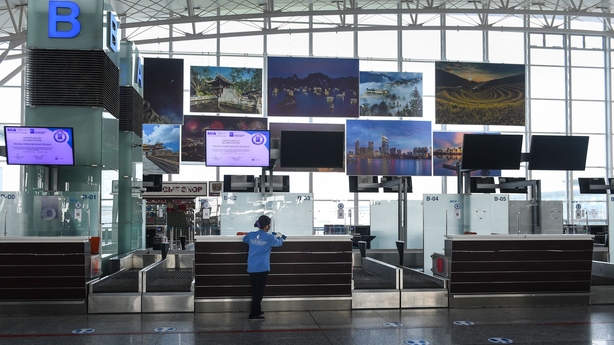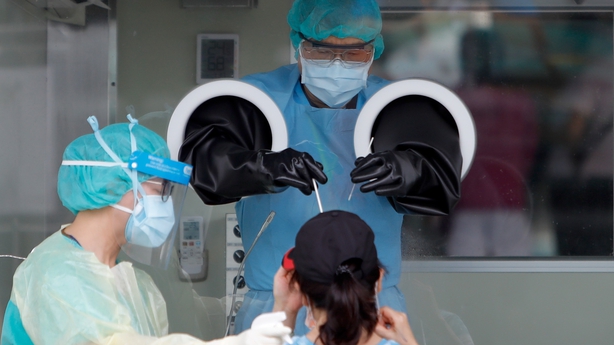Israel's Health Ministry said it had found the small number of heart inflammation cases observed mainly in young men who received Pfizer's Covid-19 vaccine were likely linked to their vaccination.
Pfizer has said it has not observed a higher rate of the condition, known as myocarditis, than would normally be expected in the general population.
In Israel, 275 cases of myocarditis were reported between December 2020 and May 2021 among more than 5 million vaccinated people, the ministry said in disclosing the findings of a study it commissioned to examine the matter.
Most patients who experienced heart inflammation spent no more than four days in the hospital and 95% of the cases were classified as mild, according to the study, which the ministry said was conducted by three teams of experts.
The study found "there is a probable link between receiving the second dose (of Pfizer) vaccine and the appearance of myocarditis among men aged 16 to 30," it said in a statement.
According to the findings, such a link was observed more among men aged 16 to 19 than in other age groups.
Pfizer said in a statement that it is aware of the Israeli observations of myocarditis, noting that no causal link to its vaccine has been established.
Adverse events are thoroughly reviewed and Pfizer meets regularly with the Vaccine Safety Department of the Israeli Ministry of Health to review data, it said.
Israel had held off making its 12 to 15-year-old population eligible for the vaccines, pending the Health Ministry report.
In parallel to publishing those findings, a ministry committee approved vaccinating the adolescents, a senior official said.
"The committee gave the green light for vaccinating 12 to 15-year-olds, and this will be possible as of next week," Nachman Ash, Israel's pandemic-response coordinator, told Radio103 FM. "The efficacy of the vaccine outweighs the risk."
A US Centers for Disease Control and Prevention advisory group last month recommended further study of the possibility of a link between myocarditis and mRNA vaccines, which include those from Pfizer and Moderna.
CDC monitoring systems had not found more cases than would be expected in the population, but the advisory group said in a statement that members felt healthcare providers should be made aware of reports of a "potential adverse event".
With Covid-19 infections down to just a handful a day and total active cases at just 340 across Israel, the economy has fully opened, though restrictions remain on incoming tourism.
About 55% of Israel's population has already been vaccinated.
As of yesterday, restrictions on social distancing and the need for special green vaccination passes to enter certain restaurants and venues were scrapped.
Vietnam reverses virus flight suspension
International flights to Vietnam's two biggest cities are to resume, officials said, reversing a short-lived ban imposed over fears of a new coronavirus wave.
The Civil Aviation Administration of Vietnam on Monday announced a temporary suspension for international passenger arrivals at Hanoi's Noi Bai airport from 1 to 7 June.
A similar decision was in force for the airport in commercial capital Ho Chi Minh City until 14 June, as the country struggles to contain a virus outbreak in more than half of its territories.

But today the aviation authority told airports and airlines that it had reversed the suspension, without mentioning a timeframe or giving an explanation.
Vietnam has managed to keep infection rates low but cases have more than doubled in the past month and now stand at more than 7,500, with 48 deaths.
It was lauded for its quick response to the pandemic last year, but vaccine roll-out has been slow.
State media have reported that authorities are appealing to private companies to procure jabs for their own workers.
There are outbreaks in industrial zones in northern Bac Giang and Bac Ninh provinces, while movements and service restrictions have been in place to deal with virus transmission in both Hanoi and Ho Chi Minh City.
As Covid-19 cases edge up, Taiwan unveils mass vaccination plan
Taiwan reported a rise in domestic coronavirus infections after six days of falls, and unveiled details of a mass vaccination plan that aims to eventually cover 1.7 million people a week.
After months of relative safety, Taiwan is battling a spike in community infections, placing curbs on gatherings and ordering entertainment venues closed, while urging people to stay at home as much as possible.
Announcing 549 new infections, including 177 added to recent days' tallies in reflection of delays in reporting positive tests, Health Minister Chen Shih-chung said the trend was stable, although it was not falling.
Cases rose rapidly in the past 24 hours in the capital, Taipei, and a neighbouring city, where infections are heavily concentrated, he added.
"It looks like it's not falling, and is sometimes still going up," Mr Chen said. "As much as possible don't go out and wear a mask."

Taiwan has vaccinated just about 3% of its 23.5 million people, but has millions of shots on order and has begun preparing for a mass vaccination programme.
Authorities plan eventually to be able to vaccinate up to 1.7 million people a week, and are working to build a simple booking system with lots of vaccination sites, said an official of the Taiwan Centres for Disease Control.
Taiwan has reported 9,389 cases since the pandemic began, including 149 deaths.

